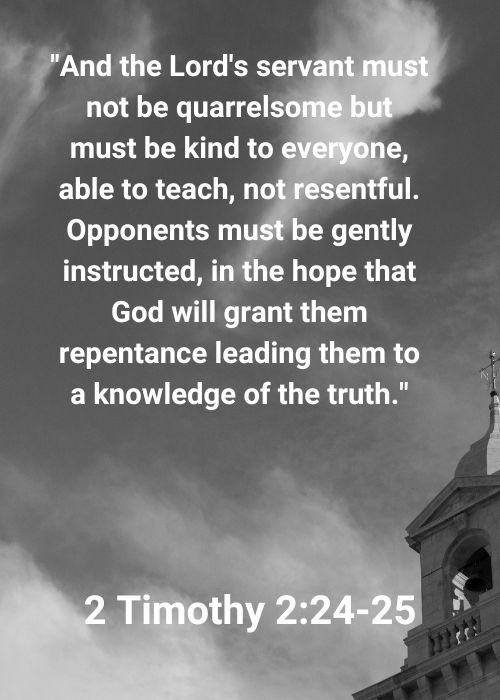The Bible, as a sacred text for Christians, provides guidance on various aspects of life, including how believers should interact with others in matters of faith.
When it comes to forcing religion on others, the Bible offers insights that emphasize respect, love, and freedom of choice.
What does the Bible say about forcing religion on others teaches that faith is a personal journey and that individuals have the freedom to choose their own beliefs.
What Does The Bible Say About Forcing Religion On Others
The Bible does not support or condone the act of forcing religion on others. It upholds the principles of free will, respect, and love when it comes to sharing one’s faith.
Coercion or forcing others to adopt a particular religion goes against the core teachings of Christianity.
Instead, believers are encouraged to share their faith through love, compassion, and respectful dialogue, allowing others to make their own decisions based on their convictions
Here are some relevant Bible verses and explanations:
Matthew 28:19-20 (NIV)
“Therefore go and make disciples of all nations, baptizing them in the name of the Father and of the Son and of the Holy Spirit, and teaching them to obey everything I have commanded you.”

This verse encourages believers to share their faith and make disciples, but it does not suggest using force or coercion.
1 Peter 3:15 (NIV)
“But in your hearts revere Christ as Lord. Always be prepared to give an answer to everyone who asks you to give the reason for the hope that you have. But do this with gentleness and respect.”

This verse emphasizes the importance of sharing one’s faith respectfully and being prepared to explain it when asked, rather than imposing it forcefully on others.
Joshua 24:15 (NIV)
“But if serving the Lord seems undesirable to you, then choose for yourselves this day whom you will serve, whether the gods your ancestors served beyond the Euphrates or the gods of the Amorites, in whose land you are living. But as for me and my household, we will serve the Lord.”

This verse highlights the freedom of choice in matters of faith. Joshua presents an option, but it is not forced upon the people; they are encouraged to make their own decision.
What Does The Bible Say About Pressuring Others?
The Bible discourages pressuring or manipulating others, particularly in matters of faith. Instead, it promotes love, respect, and persuasion through gentle and compassionate means.
Here are a few Bible verses that address this topic:
2 Timothy 2:24-25 (NIV)
“And the Lord’s servant must not be quarrelsome but must be kind to everyone, able to teach, not resentful. Opponents must be gently instructed, in the hope that God will grant them repentance leading them to a knowledge of the truth.”

This verse emphasizes the importance of kindness and gentleness when engaging with those who may hold opposing beliefs.
Titus 3:2 (NIV)
“to slander no one, to be peaceable and considerate, and always to be gentle toward everyone.”

This verse encourages believers to exhibit gentleness and consideration towards others, avoiding slander or aggressive behavior.
1 Peter 3:15-16 (NIV)
“But in your hearts revere Christ as Lord. Always be prepared to give an answer to everyone who asks you to give the reason for the hope that you have. But do this with gentleness and respect, keeping a clear conscience, so that those who speak maliciously against your good behavior in Christ may be ashamed of their slander.”

This verse stresses the importance of providing a reason for one’s faith with gentleness and respect, allowing one’s conduct and character to serve as a positive witness.
What Is It Called When You Force a Religion On Someone?
It is called proselytizing. When someone forcefully imposes or coerces their religion onto others, it is often referred to as religious proselytism or religious coercion.
Proselytism involves attempting to convert or persuade others to adopt a particular religious belief or practice, sometimes through aggressive or manipulative means.
It is important to distinguish between respectful sharing of one’s faith and the act of pressuring or forcing others to conform to a specific religious belief against their will.
What Does The Bible Say About Proselytizing
The Bible encourages believers to share their faith, but it also emphasizes the importance of doing so with love, respect, and humility.
Here are a few Bible verses that shed light on the concept of proselytizing:
Matthew 28:19-20 (NIV)
“Therefore go and make disciples of all nations, baptizing them in the name of the Father and of the Son and of the Holy Spirit, and teaching them to obey everything I have commanded you.”
This verse is known as the Great Commission, where Jesus instructs his followers to spread the Gospel and make disciples. It emphasizes the importance of sharing the message of salvation.
1 Peter 3:15 (NIV)
“But in your hearts revere Christ as Lord. Always be prepared to give an answer to everyone who asks you to give the reason for the hope that you have. But do this with gentleness and respect.”
This verse encourages believers to be ready to explain their faith when asked, but to do so with gentleness and respect, maintaining a humble and gracious attitude.
Colossians 4:5-6 (NIV)
“Be wise in the way you act toward outsiders; make the most of every opportunity. Let your conversation be always full of grace, seasoned with salt, so that you may know how to answer everyone.”
This verse advises believers to engage with others wisely and graciously, seizing opportunities to share their faith through conversations marked by grace and wisdom.
Impact Of Proselytizing According To The Bible
The Bible acknowledges the impact of proselytizing, recognizing both positive and negative outcomes depending on how it is carried out.
Here are some biblical insights on the impact of proselytizing:
Positive Effects:
- Conversion and Salvation: Proselytizing, when done with love and sincerity, can lead to individuals accepting Christ and experiencing salvation (Acts 2:41, Romans 10:14-15).
- Growth of the Church: Through spreading the Gospel, the early Christian community grew, and new believers were added to the body of Christ (Acts 2:47, Acts 6:7).
Negative Effects:
- Opposition and Persecution: Sharing the Gospel can often be met with opposition, rejection, or even persecution (Acts 4:1-3, 1 Peter 4:12-16). The Bible prepares believers for such challenges.
- Misrepresentation of the Gospel: Improper motives or methods in proselytizing can distort the message and bring disrepute to the Gospel (2 Corinthians 2:17, 2 Peter 2:1-2).
Should Parents Decide The Religion Of Their Children?
Yes, parents should decide the religion for their children. According to the Bible, some principles can guide parents in their role of guiding their children’s religious upbringing.
However, it is important to note that different interpretations and cultural contexts can influence individuals’ perspectives on this matter. Here are a few biblical principles to consider:
Parental Responsibility
Parents have the responsibility to raise and guide their children, including imparting their values and beliefs.
Many parents believe that teaching their children about their religious traditions is an essential aspect of their upbringing.
Freedom Of Belief
It is essential to respect an individual’s freedom of belief and the right to choose their religious path.
Parents should also recognize and support their children’s exploration and decision-making regarding matters of faith.
Balanced Approach
A balanced approach may involve exposing children to various religious beliefs and allowing them to explore and make informed choices as they mature.
Encouraging open discussions and providing opportunities for learning about different faiths can help foster tolerance and understanding.
Cultural Context
In some cultural or religious contexts, passing down religious beliefs through generations is deeply ingrained.
Parents may feel a cultural or religious obligation to ensure their children follow the family’s faith tradition.
Should Parents Decide The Religion Of Their Children According To The Bible?
Yes, according to the biblical principle, parents have a significant role in the spiritual upbringing of their children.
This spiritual upbringing is what will make the child decide which religion would be favorable for them.
While there isn’t a specific verse that explicitly addresses whether parents should decide the religion of their children, here are passages that provide guidance:
Proverbs 22:6 (NIV)
“Start children off on the way they should go, and even when they are old, they will not turn from it.”
This verse suggests the importance of teaching children about faith and providing a foundation for them to develop their beliefs.
Deuteronomy 6:6-7 (NIV)
“These commandments that I give you today are to be on your hearts. Impress them on your children. Talk about them when you sit at home and when you walk along the road, when you lie down and when you get up.”
This verse emphasizes the responsibility of parents to teach their children about God’s commandments and to discuss them diligently throughout daily life:
Ephesians 6:4 (NIV)
“Fathers, do not exasperate your children; instead, bring them up in the training and instruction of the Lord.”
This verse highlights the importance of nurturing children in a way that is considerate and supportive, without being overbearing or forceful.
Conclusion
The Bible does not support the idea of forcing religion on others. Instead, it encourages believers to share their faith with love, respect, and humility.
The Scriptures emphasize the importance of freedom of belief and the individual’s right to choose their faith.
While parents have a role in guiding their children’s spiritual upbringing, it is important to balance this with respect for their autonomy and allow them to make their own decisions as they mature.
The Bible teaches that true conversion and faith come from a genuine personal relationship with God, rather than through coercion or force.
Through this, believers are called to demonstrate Christ’s love and share the message of salvation with gentleness and respect.







